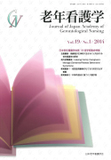Japanese
English
- 販売していません
- Abstract 文献概要
- 参考文献 Reference
抄録
本研究の目的は,特別養護老人ホーム(以下,特養)で入居者を看取る家族介護者の経験を明らかにすることである.地方都市にある特養3施設で,調査時点からさかのぼり2か月以上1年以内に死亡した入居者の主な面会者であった家族介護者15人に,入居者を看取った経験について半構成的面接法を用いてデータ収集した.分析は,Colaizziの現象学的分析方法を用いて,質的帰納的に行った.分析の結果,特養で入居者を看取る家族介護者の経験として,【入居者との絆の実感】【入居者のために自分にできるケアの模索】【職員や同室者との折り合い】【医療処置と看取りの場の選択における葛藤】【大切な人を失っていくことへの対処】【入居者の人生と看取りの意味づけ】の6つのテーマが導かれた.看護職は,家族介護者が入居者との絆を感じて行う模索や葛藤を理解し,入居者の死後,家族介護者が入居者の人生や看取りをより満足感をもって振り返ることができるよう支援することが重要である.
The number of elderly people dying in nursing homes is increasing in Japan. Nurses and other health care professionals must support the caregiving family members of dying residents in providing quality end-of-life care. However, little is known about family caregivers coping with bereavement. This study aimed to explore family caregivers' experiences with frail older adults living and dying in nursing homes.
Two to 12 months after the death of elderly residents in three nursing homes in a provincial city, semi-structured interviews with family caregivers were conducted. These interviews were audiotaped, transcribed, and qualitatively analyzed using the phenomenological analysis method of Colaizzi. This study was approved by the Ethical Committee for Epidemiology of Hiroshima University.
The participants included 15 family caregivers of 11 elderly nursing home residents. Six themes that characterized family caregivers' experiences with frail older adults living and dying in nursing homes were identified: (1) “Feeling of bonding with the resident,” (2) “looking for care that can be provided by themselves,” (3) “compromising with the staff and other residents,” (4) “experiencing difficulties with decision making regarding medical procedures and the place of death for the loved one,” (5) “coping with losing the loved one,” and (6) “giving significance to the resident's life and end-of-life care.” Nurses should understand the family caregivers' efforts and difficulties because of their feelings of bonding with the resident, and support the family caregivers so that they reflect on their caregiving experiences with a sense of satisfaction after the resident's death.
Copyright © 2014, Japan Academy of Gerontological Nursing All rights reserved.


